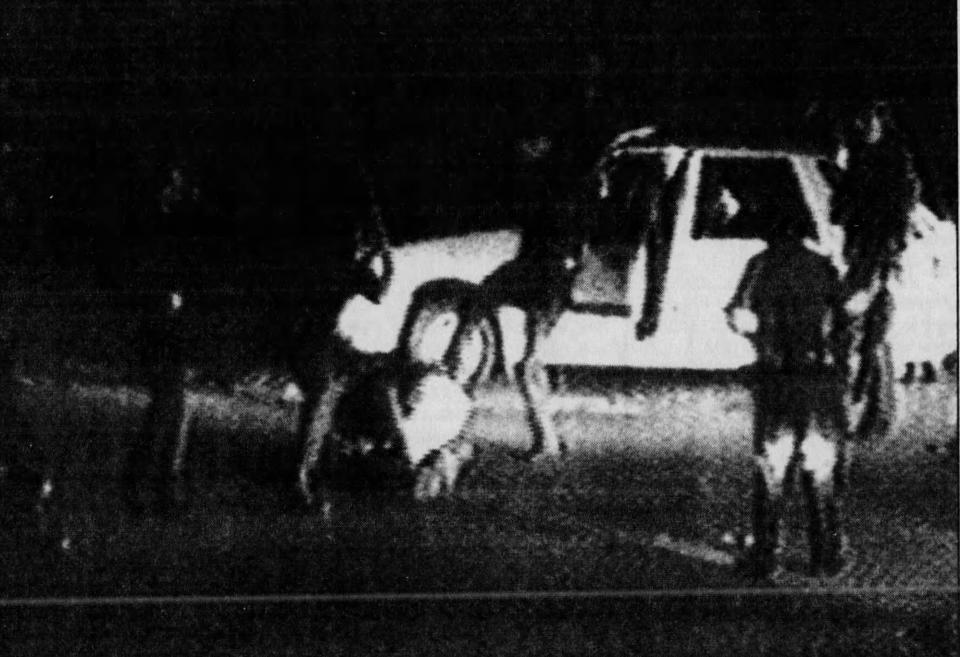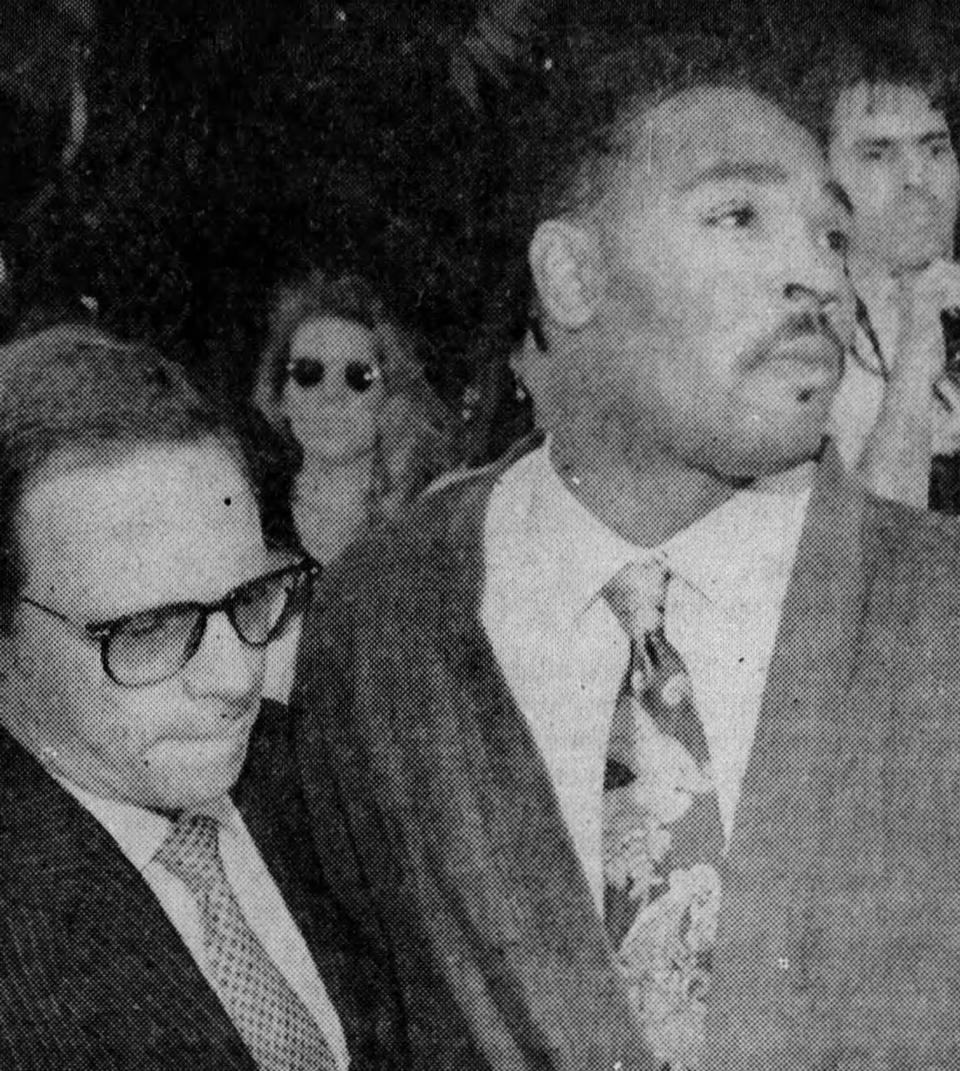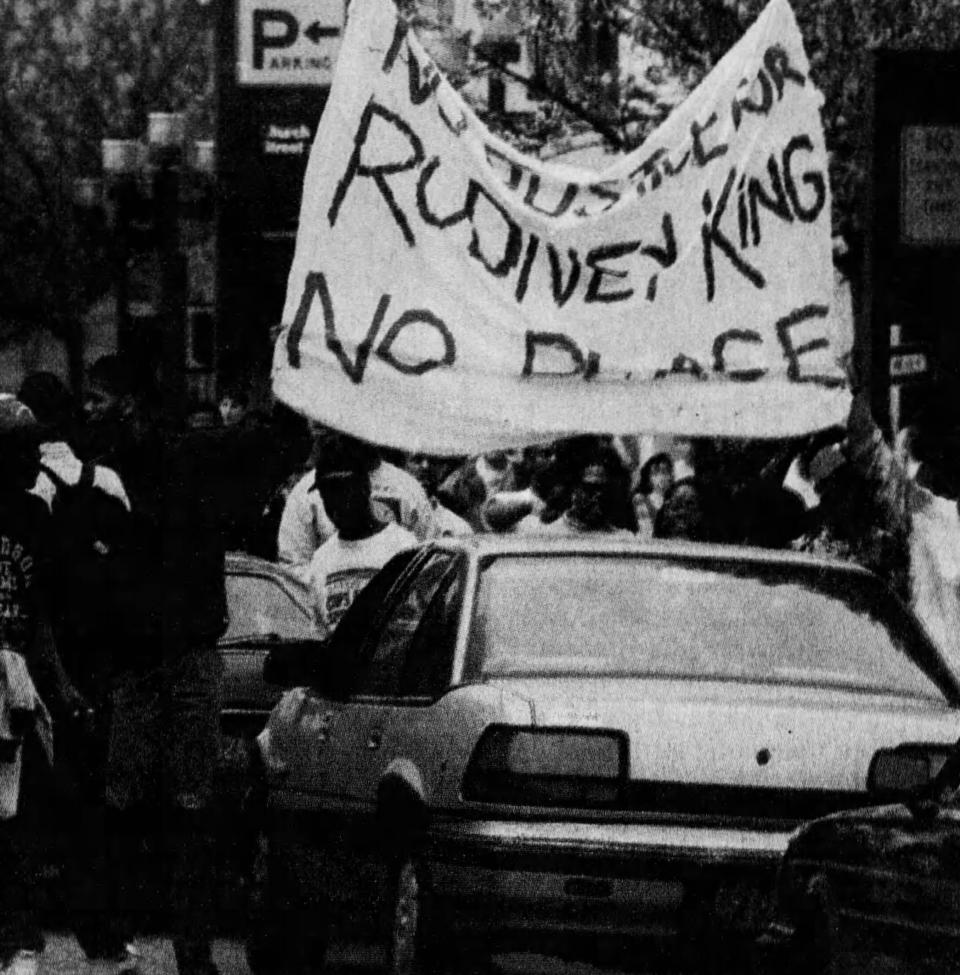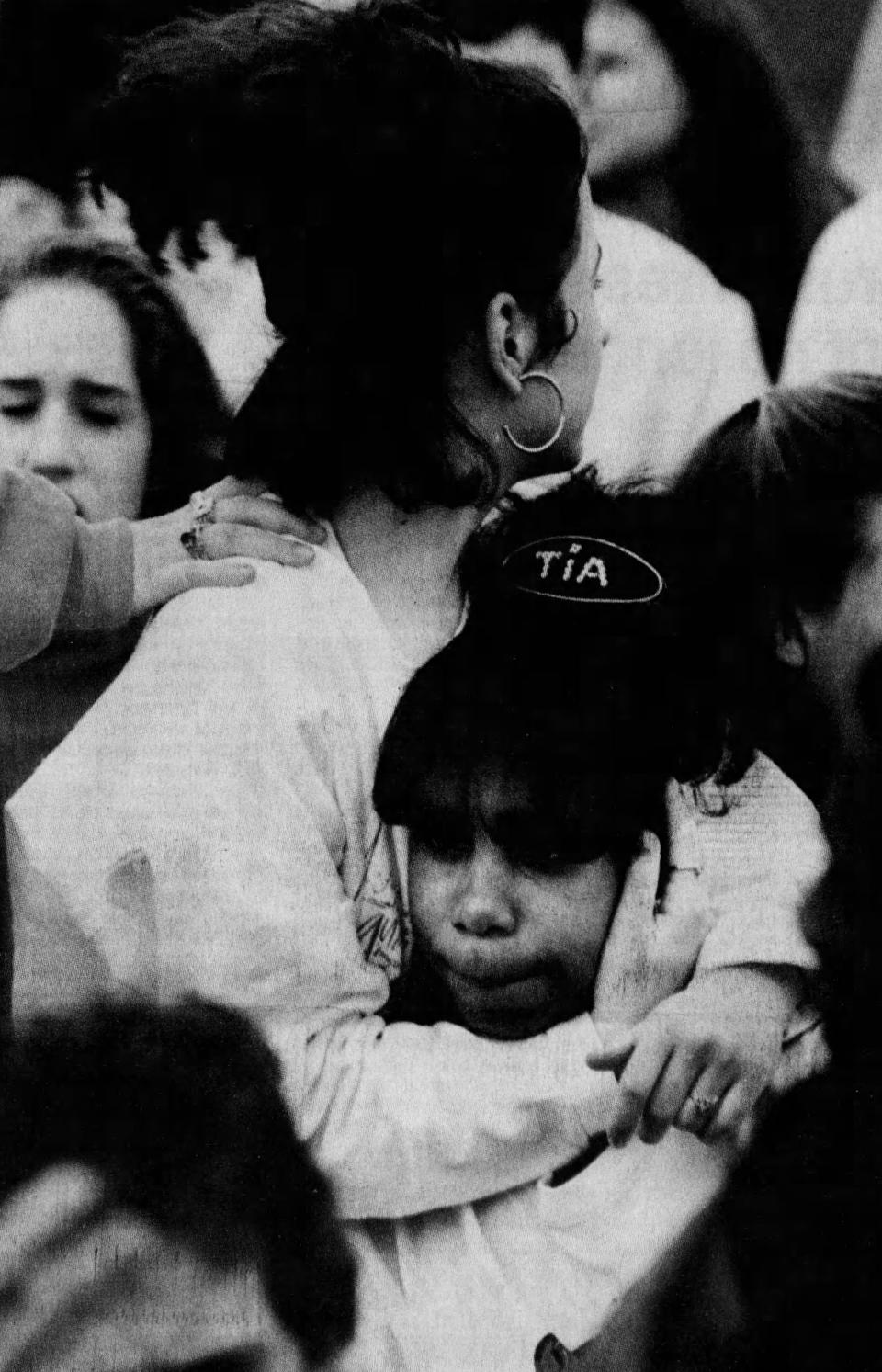Remember when ... The Rodney King verdict was followed with protests and riots
- Oops!Something went wrong.Please try again later.
It all began with a traffic violation on Sunday, March 3, 1991.
The driver, Rodney King, would later say he was traveling about 45 mph in a 35 mph zone when he was pulled over by officers. Police said King was traveling in excess of 100 mph and, after a chase, he stopped.
But, by either version, that was definitely not the end of the story.
After King, a Black man, was stopped, white police officers were videotaped by a Los Angeles resident beating him.
Reports from police officers at the scene said King made a potentially threatening gesture, made one officer lose his balance and fall, charged at officers and fought back.
A video showed officers using an electric stun gun to subdue King, then clubbing him as he begged for mercy.
However, on Wednesday, April 29, 1992 — 30 years ago today — a jury acquitted the officers of any wrongdoing, except one count of excessive force against Officer Laurence Powell. On that count, a mistrial was declared. Cleared were Sgt. Stacey Koon, Officer Theodore Briseno and Timothy Wind, a rookie who was fired after the beating.
"That beating was terrible. It was recorded. It was totally unnecessary," said Dan Jordan, who was head of Plainfield's Human Relations Commission. "What does it take to get equal justice around here? This sends out the wrong message to Black people all over the world. I couldn't be more totally shocked."
A month prior to the verdict, then-Bridgewater Police Chief Richard Z. Voorhees announced a new program, "Operation Cooperation," which would help his officers become closer to the community and make it easier to relay concerns to police.
Voorhees didn't think the acquittal would hurt his efforts to encourage communication between the police and the community. "If a policeman is doing his job and does what the public expects of him, they will support him. I certainly would hope not to see a local effect to this case. I'm still in a state of shock, though, at that verdict."
Nicholas L. Bissell Jr., who was Somerset County Prosecutor at the time, also weighed in on the verdicts.
"From here we really don't know what other evidence they had to consider, but I don't believe there was anything that could overcome that videotape," said Bissell. "Most of the time, cases like this come down to the word of the officer against the alleged victim. The tape seemed to have eliminated that difficulty. Apparently it didn't."
But Central Jersey opinions on the verdicts weren't limited to those in law enforcement.
"It's sad. It hurts citizens as well as police departments. It's going to hurt good cops. As long as they have a blue uniform, they're going to be looked upon as the enemy," said Rev. James Kirk, who at the time was pastor of the Sharon Baptist Church in New Brunswick.
Remember when … The shocking space shuttle Challenger tragedy
The much-played videotape of the King beating and the verdict that followed left Central Jerseyans reeling.
"To review the videotape and see the result of the jury's verdict is absolutely shocking," said Jim Cahill, mayor of New Brunswick.
"It wasn't fair. They showed you the pictures of what was happening, and they didn't take heed of any of it," said Eloise Jasmin, assistant teacher at the Paul Robeson Community School in New Brunswick, in a Friday, May 1, 1992, article. "I'm not looking at color. I'm leaving color out of it. I'm looking at the whole situation, where the fella's not getting a decent trial."

Whether intentional or not, the verdict sent a message, said then-Assemblyman Joseph Charles, D-Hudson.
"Those jurors told Rodney King and the rest of the world that violence and racism is OK," said Charles. "We have to tell them differently."
The verdicts not only led to Central Jerseyans voicing their opinions, they also led to protests.
Remember when … Deadly flood waters ravaged Central Jersey nearly 50 years ago
On Friday, May 1, 1992, approximately 500 Rutgers students and residents took to the streets to protest the verdicts. The protesters held up traffic on Route 18 for nearly half an hour at one point. After the demonstration, no arrests or injuries were reported.
The protestors rallied at Rutgers Stadium on the Busch campus in Piscataway and marched to Brower Commons on the College Avenue campus in New Brunswick.
At the commons, the crowd listened to speakers who refused to identify themselves. One said, "Just call me Rodney King."

The march continued down College Avenue through the streets of New Brunswick. To prevent confrontations between motorists and marchers, police blocked side streets.
Residents of the New Brunswick Housing Authority University Towers projects joined the marchers before they crossed Route 18 and stopped traffic by sitting on the roadway in front of the New Brunswick Police Department.
Leaders said the demonstrators left Route 18 because they didn't want the large number of small children in the crowd to be hurt.
Remember when … 'Hell broke loose': The Edison gas pipeline explosion
They gathered in front of the Hyatt Regency Hotel on Route 27 for several minutes before again sitting down in front of the Johnson & Johnson Headquarters across the street.
The leaders gave the crowd a message before urging them to disperse: "When you leave here, don't forget what you have done, and what has happened. Go home in peace, but remember, you could be Rodney King tomorrow."
The discord wasn't just at Rutgers.

Hundreds of students and faculty members swamped Princeton University's Firestone Plaza on Friday, May 1, 1992 to protest the acquittals.
"Justice was not done," said Karen Jackson, then a Princeton University sophomore from Virginia who was president of the on-campus NAACP chapter. "We are rallying here today because we want justice. We want to be treated with respect."
On Monday, May 4, 1992, about 1,200 students poured out of Bridgewater-Raritan High School to stage a peaceful march protesting the verdicts and racism in America.
After learning many students were planning to assemble outside, despite a warning they could face disciplinary action for cutting class, then-Principal Charles Crosby stepped in to lead the 45-minute "peace walk."
On the West Coast, there was violence.

On the day the verdicts were announced, riots, arson and looting broke out in Los Angeles and spread to outlying suburbs. On the second night of the unrest, National Guard troops moved into some of the devastated neighborhoods.
Among the indelible images from the Los Angeles riots in response to the verdict was when Reginald Denny was beaten unconscious after being dragged from his truck at an intersection in South Central Los Angeles when the riots broke out.
The violence led King to ask, "Can't we all just get along?" King died in 2012.
This article was compiled using archived reports that appeared in the Courier News and The Home News Tribune.
What do you remember about this event? Visit This Week in Central Jersey History/Remember When at https://bit.ly/3IyzE1G.
Be sure to "like" the page, as well as leave your memories of this event! You can also email your memories to bwadlow@gannettnj.com, or click on the Comment button and share them there.
Brad Wadlow is a staff writer for MyCentralJersey.com.
This article originally appeared on MyCentralJersey.com: Rodney King case: Los Angeles police officers acquitted April 29, 1992

